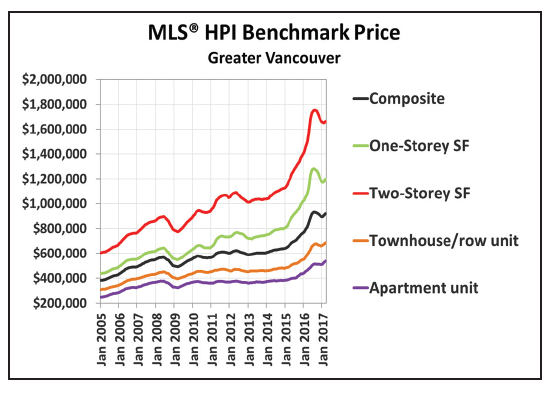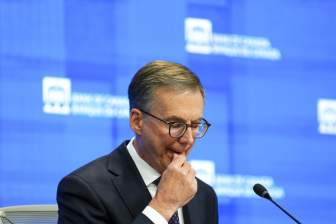Just as Toronto weighs a “suite” of measures to improve housing affordability, as Ontario Finance Minister Charles Sousa put it on Tuesday, prices in Greater Vancouver have quietly started to creep up again.

READ MORE: Why people across Canada should care about Toronto’s housing market
Among the measures Sousa is about to introduce are a new levy on housing speculators and a tax on properties that are left vacant, according to the Toronto Star.
But if prices in Vancouver keep climbing, it might mean that the impact of British Columbia’s foreign buyer tax is wearing off and that Toronto’s own housing taxes might deliver only a temporary reprieve.
READ MORE: Price of Toronto-area homes jump 33.2% in March compared to last year
Is the Vancouver housing market coming back?
That’s what BMO economist Douglas Porter wondered out loud in a research note Tuesday morning.
“While sales are down 31.5 per cent from the white-hot pace of a year ago, most signs suggest things have stabilized,” he wrote.
For months sales have plummeted and prices dipped in Vancouver, where the provincial government introduced a 15 per cent tax on foreign buyers of real estate at the beginning of August.
WATCH: Experts believe Metro Vancouver housing market is about to bounce back

But the average price of Vancouver residential property rose from around $949,000 in February to about $960,000 in March, a 1.2 per cent increase, according to data released Tuesday by the Canadian Real Estate Association.

Get weekly money news
Prices were still down over nine per cent compared to March of 2016, when the average Vancouver home cost almost $1.1 million, but the monthly increase from February was sizable. Prices in the red-hot market of Greater Toronto, by comparison, rose 3.6 per cent, from around $861,700 to around $893,000.
According to the MLS Home Price Index Benchmark Price, Vancouver property appreciated nearly 1.4 per cent in March compared to a month earlier and 2.4 per cent compared to three months earlier. The HPI benchmark price measures the value of a typical home in a given housing market, taking into account things such as lot size, age, and number of rooms.
“The HPI is up over the past three months, and is now just shy of the all-time high,” Porter noted.
- Air passenger rights advocate wants answers after temporarily restricted from Facebook
- Sentencing hearing begins for woman in Invermere triple fatal drunk-driving crash
- Man charged in connection with Surrey extortion-related shooting
- With 185 days to FIFA World Cup, Vancouver’s unhoused, accommodations face questions

READ MORE: Are federal mortgage rules actually working? Not really.
Housing taxes may be only a temporary fix
It’s a bit too soon to judge the full impact of Vancouver’s foreign buyer tax, said Porter, but historical precedent suggests these sorts of measures can’t completely cool real estate markets on their own, Porter told Global News. That seems to be the takeaway from similar attempts in places like Australia, Singapore and Hong Kong, he noted.
In order to truly tame the real estate frenzy in Vancouver and Toronto, interest rates would likely have to rise as well, said Porter.
However, higher interest rates would cool off activity not just in real estate but throughout the economy. The Bank of Canada (BoC) has so far held off using that lever but is widely expected to start hiking rates in late 2017 or early 2018, as domestic growth gains momentum.
Even if housing taxes in Toronto were to prove only a temporary fix, they could help slow down house price growth before the BoC starts raising interest rates or additional housing supply becomes available, Porter told Global News.
READ MORE: Ontario looking at non-resident speculation tax to cool hot housing market
Taxes won’t make Toronto affordable
New housing-related taxes won’t make Toronto affordable, either, warns Porter.
Vancouver’s foreign buyer tax “did seem to pretty abruptly take some of the feeding frenzy out of the market,” said Porter. But the fact that prices stopped growing at breakneck speed did little to bring home prices within the range of middle-income families.
These measures are really just about “avoiding a bubble-like situation,” said Porter.
READ MORE: Here’s when you need to worry about a housing bubble — and when you don’t
Sousa’s arsenal will reportedly contain far more than housing taxes and include steps such as rent control. He has also spoken about expanding the city’s housing supply.
Time will tell whether he has found the silver bullet that has eluded so many other policymakers.
WATCH: Tenant of west-end Toronto condo says she will move after rent doubles









Comments